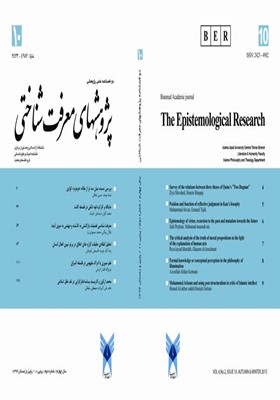معرفت شناسی فضیلت، بازگشتی به گذشته و جهشی به سوی آینده
محورهای موضوعی : پژوهشهای معرفت شناختیجلال پیکانی 1 * , محمد مسعودی نیا 2
1 - دانشیار گروه فلسفه دانشگاه پیام نور
2 - مربی دانشکده الهیات دانشگاه پیام نور
کلید واژه: معرفت شناسی فضیلت, ارنست سوزا, لیندا زاگزبسکی, فضایل عقلانی, شایستگی باور,
چکیده مقاله :
معرفت شناسی معاصر تحت تأثیر علم گرایی حاکم بر فلسفه تحلیلی قرن بیستم، رویکردی یکسره مکانیستی به معرفت را اتخاذکرده و تمامی وجوه غیرمعرفتی را از معرفت شناسی زدوده است. این رویکرد باعث نوعی رکود در معرفت شناسی معاصر شده است. اما در سال های اخیر از بطن همین معرفت شناسی، رویکردی جدید روییده است که جریان غالب را برنمی تابد و با الهام از معرفت شناسان گذشته، معتقد است نقش عوامل روانی غیرمعرفتی فاعل شناسا را نمی توان در حصول معرفت نادیده گرفت. دو تن از چهره های برجسته این نظریه که معرفت شناسی فضیلت نامیده می شود، عبارتند از ارنست سوزا و لیندا زاگزبسکی. آنها معرفت را محصول کارکرد درست قوایی در فاعل شناسا می دانند که همگی شاید قوای معرفتی، به معنای رایج، تلقی نشوند. آنها شروط معرفت را نه در باور بلکه در فاعل شناسا و عامل شناخت میجویند. در این مقاله ضمن تمرکز بر تأکید معرفت شناسی فضیلت بر نقش عوامل غیرمعرفتی در حصول معرفت، نشان داده شده است که این مؤلفه می تواند افق های جدیدی را در معرفت شناسی معاصر بگشاید و آن را از رکود فعلی خارج کند.
Contemporary epistemology has been influenced by scientism which dominates the analytical philosophy during twentieth century, and considered the knowledge by pure mechanical approach leading to remove non-cognitional aspects from contemporary epistemology. Accordingly, it comes to the kind of depression in the contemporary epistemology. Recently, new approach has grown within that epistemology which cannot stand the dominated process and by inspiring the earlier epistemologists, cannot take the role of non-cognitive psychological agents into consideration in the subjectiveness acquiring the knowledge. Ernest Susa and Linda Zagzebski are two outstanding figures belong to the epistemology of virtue. They introduce the episteme as a result of correct function of faculties in the subject that all of them are not directly the epistemological faculties in their own general senses. Therefore, they look for the condition of episteme not in the belief, but in the subject and cognitive agent. This article, in addition to concentrate on the insisting of epistemology of virtue on the role of non-cognitional agents in obtaining the episteme, has shown that this factor can open the new approach in contemporary epistemology and take it out of the current recession.
Alston, William (2005) Beyond Justification: Dimensions of Epistemic Evaluation, Ithaca, NY: Cornell University Press.
Battaly, Heater (2001) “This Concepts to the Rescue: Thinning the Concepts of Epistemic Justification and Intellectual Virtue”, in Abrol Fairweather and Linda Zagzebski, Virtue Epistemology, New York: Oxford University Press.
Kvanvig, Jonathan (2010) “Sosa’s Virtue Epistemology”, Critica, 42(125): 47-62.
Quine, W. V. Q. (1994) “Epistemology Naturalized”, in Naturalazing Epistemology, edited by Hillary Kornblith, Cambridge: MIT Press, pp.15-32.
Sosa, Ernest (1991a) “The Raft and the Pyramid: Coherence versus Foundations in the Theory of Knowledge”, in Knowledge in Perspective: Selected Essays in Epistemology, Cambridge: Cambridge University Press.
-------. (1991b) “Intellectual Virtue in Perspective”, in Knowledge in Perspective: Selected Essays in Epistemology, Cambridge: Cambridge University Press.
-------. (1991c) “Reliabilism and Intellectual Virtue”, in Knowledge in Perspective: Selected Essays in Epistemology, Cambridge: Cambridge University Press, pp.131-147.
Wedberg, Anders (1966) A History of Philosophy: From Bolzano to Wittgenstein, Oxford: Clarendon Press.
Zagzebski, Linda (1996) Virtues of the Mind, an Inquiry into the Nature of Virtue and the Ethical Foundations of the Mind, New York: Cambridge University Press.
-------. (2001) “Introduction”, in Abrol Fairweather and Linda Zagzebski, Virtue Epistemology, New York: Oxford University Press.

